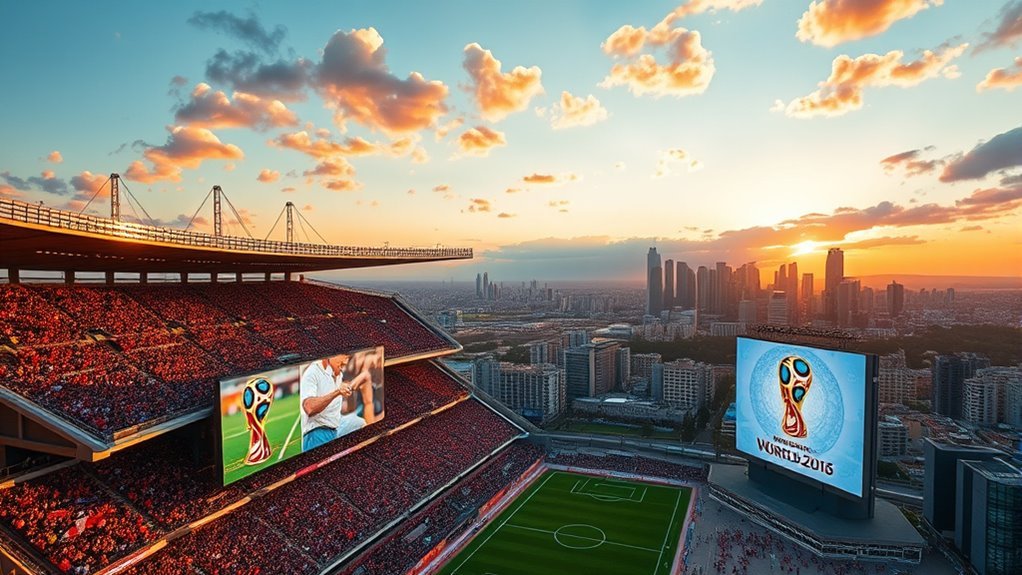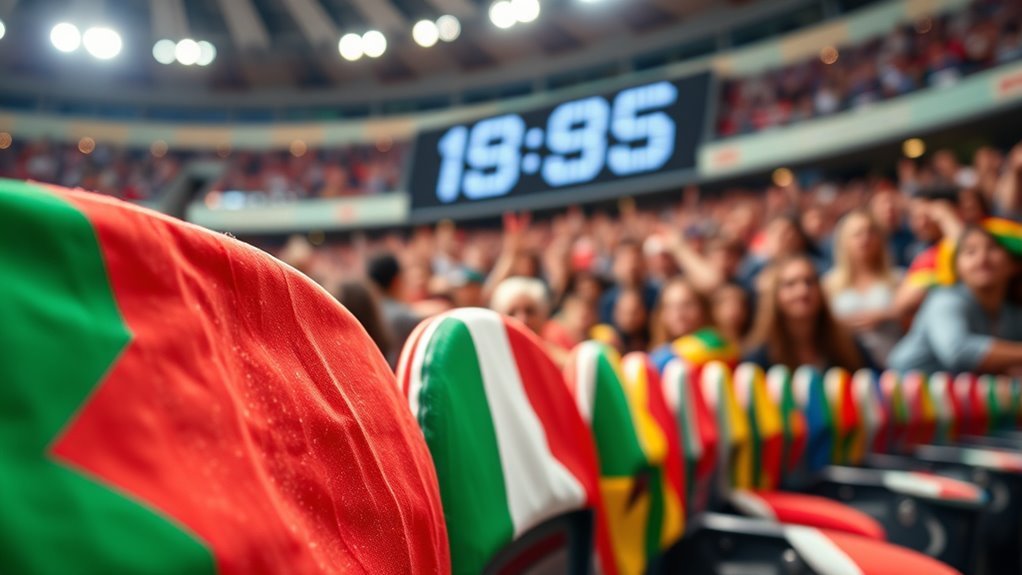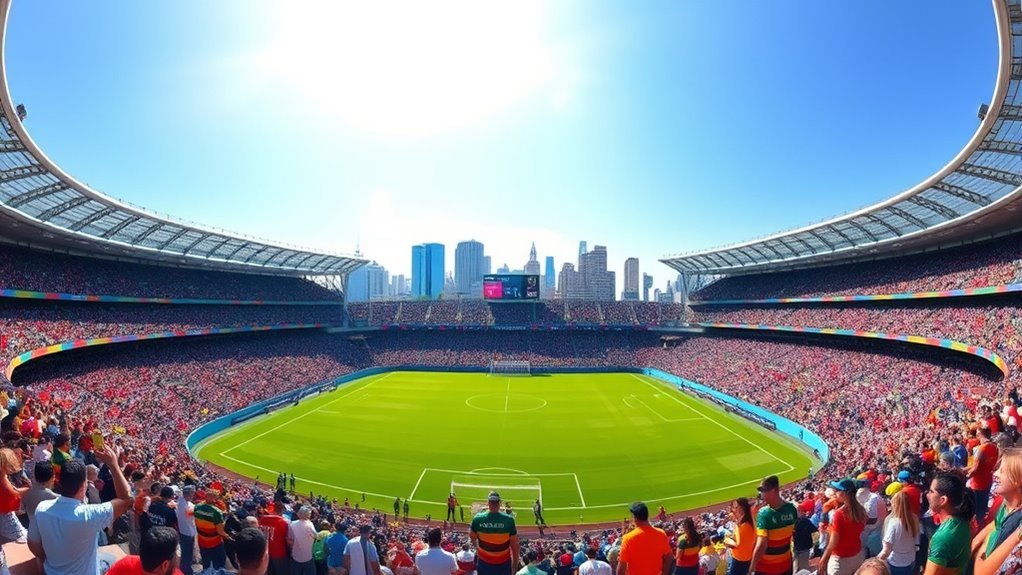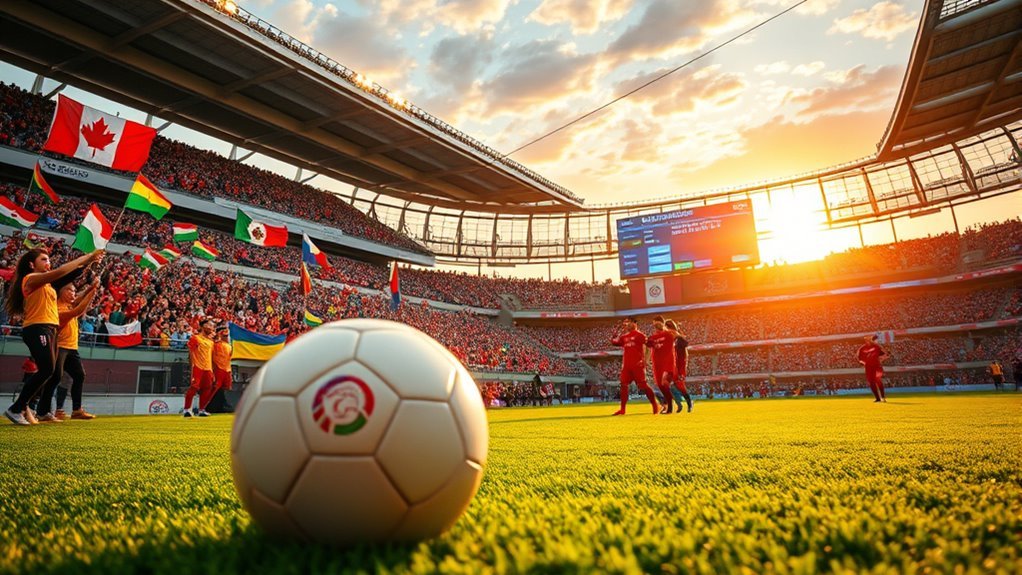As of now, the FIFA World Cup 2026 is set to take place across the U.S., Canada, and Mexico. However, concerns about facility readiness and logistical issues have sparked speculation about a potential relocation. From stadium compliance to transportation challenges, there’s a lot to address. Fans are vocal about their worries too. It’s a complicated situation, and if you’re curious about what this means for the tournament, there’s more to uncover.
Overview of the FIFA World Cup 2026 Hosting Structure
As the FIFA World Cup 2026 approaches, you’ll find that its hosting structure is set to be more expansive than ever, with the tournament shared among the United States, Canada, and Mexico. This unprecedented collaboration will see multiple hosting cities across these countries, each bringing its unique flavor and culture to the event.
The tournament format will feature an expanded roster of 48 teams, allowing for a greater variety of matchups and experiences. You’ll witness thrilling games in iconic stadiums, from bustling urban centers to more intimate venues. This structure not only promotes unity among the host nations but also encourages fans to explore diverse regions and traditions.
With the spotlight on freedom and celebration, the 2026 World Cup promises to be a vibrant festival of soccer that unites people from all walks of life, making it a truly remarkable event for everyone involved.
Current Concerns Regarding U.S. Hosting Capabilities
While the excitement for the 2026 FIFA World Cup is palpable, concerns about the U.S. hosting capabilities have begun to surface. Issues like facility readiness and the overall infrastructure are raising eyebrows among fans and officials alike. It’s crucial to guarantee that stadiums and accommodations meet the high standards expected at such a prestigious event.
Here’s a look at some current concerns:
| Concern | Description |
|---|---|
| Facility Readiness | Are stadiums up to code and equipped? |
| Accessibility | Can fans easily reach venues? |
| Security Measures | Are safety protocols adequate? |
| Accommodation | Will there be enough lodging available? |
| Transportation | Is travel between venues efficient? |
The commitment to providing an unforgettable experience hinges on addressing these concerns. Fans deserve freedom from worry about these critical hosting capabilities as we approach this monumental tournament.
Logistical Challenges Facing the Tournament
Despite the excitement surrounding the 2026 FIFA World Cup, logistical challenges loom large, threatening the smooth execution of the tournament. You might not realize just how intimidating transportation hurdles can be. With fans from all over the globe converging on the U.S., managing their movement between cities could become a nightmare. Traffic congestion, limited train services, and overcrowded airports could all hinder the experience you’re hoping for.
Accommodation shortages also pose a significant problem. With millions of fans expected, finding a place to stay might be tougher than you think. Hotels could fill up quickly, and prices might skyrocket, leaving many without options. If these issues aren’t addressed, it could overshadow the thrilling atmosphere you’re looking forward to. It’s essential that organizers tackle these logistical challenges head-on to guarantee the 2026 World Cup lives up to its legendary status, allowing everyone to enjoy the freedom of this global celebration.
Security Issues and Their Impact on the Event
Given the heightened awareness of security concerns in today’s world, the 2026 FIFA World Cup must prioritize safety measures to secure a safe environment for fans and players alike. Effective event coordination will play an important role in addressing these issues.
| Security Measures | Impact on Event |
|---|---|
| Enhanced surveillance systems | Increased fan confidence |
| Extensive crowd control | Smooth entry and exit |
| Collaboration with local law enforcement | Rapid response to incidents |
You want to enjoy the thrill of the tournament without fear. By implementing stringent security measures, organizers can create a welcoming atmosphere, fostering a sense of freedom and unity. Your safety matters; it’s vital for a successful event. As the countdown to the World Cup begins, let’s hope that authorities prioritize these important aspects to guarantee an unforgettable experience for everyone involved.
Infrastructure Readiness in Host Cities
As the 2026 FIFA World Cup approaches, host cities must guarantee their infrastructure is ready to accommodate the influx of fans and players. You’ll want to see cities investing in roads, public transport, and facilities that reflect the excitement of the event. Smart urban planning will play a vital role in ensuring smooth movement and access to venues.
It’s not just about having enough seats in stadiums; the experience of fans hinges on seamless travel and vibrant surroundings. Infrastructure investments can breathe new life into communities, offering long-term benefits that extend beyond the tournament.
Think about enhanced public spaces, safe transit options, and accommodations that cater to diverse needs. With strategic planning and investment, cities can create an atmosphere of freedom and celebration, welcoming everyone to partake in the world’s greatest sporting event. The stage is set, but it’s up to the host cities to rise to the occasion.
Perspectives From Fans and Officials
As the news of the World Cup moving out of the U.S. sinks in, fans are sharing their reactions and concerns about the impact on their plans. Officials, on the other hand, are providing insights and statements that may shape the future of the tournament. You might be wondering how potential venue changes could affect the overall experience for everyone involved.
Fan Reactions and Concerns
How do fans feel about the potential relocation of the FIFA World Cup 2026 from the U.S.? Many are concerned about losing the chance for meaningful fan engagement and the accessibility of tickets. The potential move could hinder the spirit of unity and celebration that the World Cup represents.
Here’s a snapshot of fan reactions:
| Concern | Impact on Fans | Suggested Solutions |
|---|---|---|
| Loss of Engagement | Reduced community spirit | Increase local events |
| Ticket Accessibility | Higher costs for travel | Virtual participation options |
| Cultural Disconnect | Less connection to teams | Promote local fan zones |
| Uncertainty | Anxiety over travel plans | Clear communication from FIFA |
Fans want their voices heard—will FIFA listen?
Official Statements and Insights
The concerns raised by fans have prompted officials to respond, highlighting the significance of the World Cup’s location. In recent official statements, FIFA representatives emphasized their commitment to ensuring that the tournament remains in the United States. They acknowledged the passionate voices of fans and the importance of hosting insights that reflect the spirit of the game. Officials want to assure everyone that they’re actively monitoring the situation and are dedicated to addressing any potential challenges. Your enthusiasm and support play an essential role in shaping the event’s future. As we move forward, it’s imperative to stay united and hopeful, knowing that the World Cup’s essence thrives in the hearts of fans like you, no matter where it’s held.
Potential Venue Changes
While many fans express concern over potential venue changes for the 2026 FIFA World Cup, officials are carefully weighing the implications of such decisions. You might feel a mix of excitement and anxiety as venue selection processes unfold. Relocation implications can be significant, impacting not just the event’s logistics but also the spirit of the tournament. Fans want the World Cup to feel accessible and inclusive, and shifting locations could disrupt that sense of community. It’s vital for officials to take into account feedback from supporters to guarantee that any changes reflect the desires of the fanbase. Ultimately, the goal should be to create an unforgettable experience that celebrates football, regardless of where the matches take place.
Potential Outcomes of a Relocation Decision
If the FIFA World Cup 2026 relocates, you’ll want to reflect on how it might affect the local economy, fan experiences, and the logistics of hosting such a massive event. Each of these factors plays a vital role in determining the overall success and enjoyment of the tournament. Let’s explore the potential consequences together.
Economic Impact Analysis
Given the potential relocation of the FIFA World Cup 2026, it’s crucial to reflect on the economic ramifications for both the U.S. and the new host nation. The shift could lead to significant changes in economic benefits and hosting investments.
- Job Creation: New opportunities in construction, hospitality, and tourism can emerge in the new host country.
- Tourism Boost: Increased international visitors can drive revenues, benefiting local businesses.
- Infrastructure Development: Investments in facilities and transportation can modernize the host nation.
- Long-term Economic Growth: Successful hosting can position the new host as a future destination for major events.
These factors highlight the importance of weighing the economic impact of such a monumental decision. You want to reflect on how these changes could shape both economies in the years to come.
Fan Experience Considerations
The potential relocation of the FIFA World Cup 2026 raises important questions about fan experience in the new host nation. You’ll want to know how this shift could affect your enjoyment and connection to the event. A new location means fresh fan engagement strategies will be vital in maintaining an international fanbase. The host nation must create an atmosphere that welcomes fans from all over the world, offering diverse cultural experiences and accessible events. If executed well, these strategies can enhance your experience, making it memorable and inclusive. However, if the relocation fails to resonate with fans, it could lead to disappointment and disengagement. Ultimately, you deserve an unforgettable experience, regardless of where the tournament takes place.
Logistical Challenges Faced
As the FIFA World Cup 2026 potentially shifts to a new host nation, numerous logistical challenges emerge that could impact both organizers and fans alike. You might find yourself concerned about how these factors could affect your experience:
- Transportation logistics: Ensuring smooth travel routes for teams and fans may prove challenging.
- Venue accessibility: New locations could mean different infrastructure, affecting how easily you can reach stadiums.
- Accommodation availability: Finding enough lodging for the influx of visitors poses another challenge.
- Cultural integration: Adapting to a new host nation’s culture and systems might complicate your experience.
Navigating these hurdles is essential for maintaining the tournament’s spirit and ensuring everyone’s enjoyment. The freedom to celebrate the World Cup should never be hindered!
Frequently Asked Questions
How Many Countries Are Hosting the FIFA World Cup 2026?
Three countries—Canada, Mexico, and the U.S.—are hosting the FIFA World Cup 2026. These nations face hosting challenges, yet together, they’ll create a global impact, celebrating freedom and unity through the beautiful game.
What Cities Are Selected to Host Matches in the U.S.?
You’ll find match venues in cities like Atlanta, Boston, Dallas, Houston, Kansas City, Los Angeles, Miami, New York/New Jersey, Philadelphia, San Francisco/Bay Area, and Seattle. Each host city’s unique vibe adds to the experience!
Will Ticket Prices Change if the Tournament Relocates?
If the tournament relocates, ticket prices might fluctuate. You could see changes in ticket affordability and fan accessibility, as different venues often bring varying costs. Always keep an eye on updates for the best options!
How Will Relocation Affect Fifa’s Revenue and Sponsorship Deals?
Relocation could lead to significant revenue loss, as sponsors may reconsider their investments based on market appeal. You’ll see a sponsorship impact, with companies less willing to commit if the tournament’s location changes dramatically.
What Criteria Determine the Decision to Move the World Cup?
When deciding to move the World Cup, criteria analysis focuses on logistics, fan accessibility, and safety. Consider how relocation impacts local economies and sponsorships, ensuring that every decision echoes the vibrant spirit of freedom and unity.




